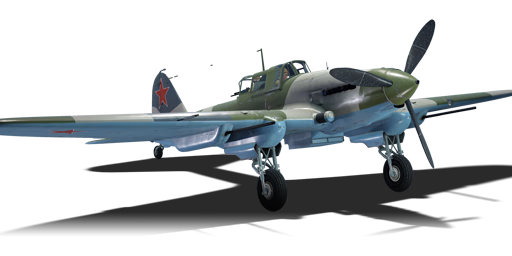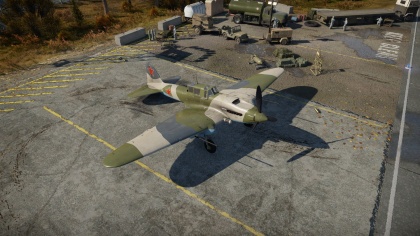IL-2-37
Contents
| This page is about the Soviet attacker IL-2-37. For other uses, see IL-2 (Family). |
Description
The IL-2-37 is a rank II Soviet attacker
with a battle rating of 3.0 (AB), 2.7 (RB), and 3.7 (SB). This attacker was introduced in Update 1.49 "Weapons of Victory".
The IL-2-37 is the slowest of all of the extended-cockpit IL-2 variants (those featuring a gunner). As such, the IL-2-37 should be played as an attacker and only as an attacker. Anything else will get it destroyed very quickly.
The IL-2-37 is meant for swooping down and taking out tanks with it's dual 37 mm NS-37 cannons. It does a fairly decent job at doing so, it is recommended to dive at a high angle and shoot the top of the tank to set them on fire or kill the crew.
General info
Flight Performance
| Characteristics | |||||||
|---|---|---|---|---|---|---|---|
| Stock | |||||||
| Max Speed (km/h at 1,320 m) |
Max altitude (meters) |
Turn time (seconds) |
Rate of climb (meters/second) |
Take-off run (meters) | |||
| AB | RB | AB | RB | AB | RB | ||
| 367 | 357 | 5,200 | 41.9 | 43.7 | 6.2 | 6.2 | 550 |
| Upgraded | |||||||
| Max Speed (km/h at 1,320 m) |
Max altitude (meters) | Turn time (seconds) | Rate of climb (meters/second) |
Take-off run (meters) | |||
| AB | RB | AB | RB | AB | RB | ||
| ? | ? | 5,200 | ??.? | ??.? | ?.? | ?.? | 550 |
Details
| Features | ||||
|---|---|---|---|---|
| Combat flap | Take-off flap | Landing flap | Air brakes | Arrestor gear |
| ✓ | ✓ | ✓ | X | X |
| Limits | ||||
|---|---|---|---|---|
| Wing-break speed (km/h) |
Gear limit (km/h) |
Combat flap (km/h) |
Max Static G | |
| + | - | |||
| 620 | 320 | 470 | ~9 | ~9 |
| Optimal velocities | |||
|---|---|---|---|
| Ailerons (km/h) |
Rudder (km/h) |
Elevators (km/h) |
Radiator (km/h) |
| < 320 | < 320 | < 320 | > 270 |
| Compressor (RB/SB) | ||
|---|---|---|
| Setting 1 | ||
| Optimal altitude | 100% Engine power | WEP Engine power |
| 750 m | 1,500 hp | 1,593 hp |
Survivability and armour
- 6 mm Steel plate behind propeller.
- 4 mm Steel plate covering the front fuselage.
- 12 mm Steel plate in air intake.
- 6 mm Steel plates around the oil cooling system.
- 5 mm Steel plates around the fuel tank.
- 6 mm Steel plates surrounding the cockpit.
- 64 mm Bulletproof glass in cockpit front.
- 4 mm Steel plate above cockpit fuel tank.
- 12 mm Steel plate separating cockpit and rear gunner.
- 6 mm Steel plate in front of the rear gunner.
Armaments
Offensive armament
The IL-2-37 is armed with:
- 2 x 37 mm NS-37 cannons, wing-mounted (50 rpg = 100 total)
- 2 x 7.62 mm ShKAS machine guns, wing-mounted (750 rpg = 1,500 total)
Suspended armament
The IL-2-37 can be outfitted with the following:
- Without load
- 4 x 50 kg FAB-50 bombs (200 kg total)
- 2 x 100 kg FAB-100 bombs (200 kg total)
Defensive armament
The IL-2-37 is defended by:
- 1 x 12.7 mm Berezin UB machine gun, rear turret (150 rpg)
Usage in the battles
Being a true attacker, it should head straight to its target immediately as the battle starts.
Tips for gunners
The gunner is extremely powerful and accurate even before upgrades, it is not uncommon to get three or more gunner kills in one game. Take advantage of the fact that many enemies will approach the aircraft from straight behind, so switch to gunner view and just aim for the cockpit of the enemy plane attacking the tail. Use the Armoured targets belt for the gunner, as they feature a cement-core round capable of penetrating through most bulletproof glass, engine casing, and armour.
37 mm's
The IL-2-37 comes with a pair of 37 mm guns, each with 50 rounds loaded. In tank battles, dive from above and attack targets through their more vulnerable roof. In air battles, come from the side or back as enemies are usually travelling in a straight line. Set a gun targeting distance of no less than 500 m so the IL-2-37 can pull out of the fray once it passes over. When the enemy is in sights, fire once and see if the shots hit and kill the target. If it doesn't, fire again, and pull out of the engagement if the target was not destroyed in the two volleys. Go around for another pass or focus on a new ground target in the IL-2-37's flight path.
Manual Engine Control
| MEC elements | ||||||
|---|---|---|---|---|---|---|
| Mixer | Pitch | Radiator | Supercharger | Turbocharger | ||
| Oil | Water | Type | ||||
| Controllable | Not controllable | Not controllable | Not controllable | Separate | Not ontrollable | Not controllable |
Modules
| Tier | Flight performance | Survivability | Weaponry | ||
|---|---|---|---|---|---|
| I | Fuselage Repair | Radiator | Offensive 7 mm | Turret 12 mm | |
| II | Compressor | Airframe | New 7 mm MGs | New 12 mm MGs (turret) | |
| III | Wings Repair | Engine | Offensive 37 mm | Der-21 | |
| IV | 95 Octane Fuel Usage | Engine Injection | Cover | New 27 mm Cannons | |
Pros and cons
Pros:
- Great at ground striking
- Has dual 37 mm NS-37 cannons on the wings
- Extremely generous ammo count
- One of the most durable single-engine planes in the game
- First Sturmovik model with a rear gunner
Cons:
- Hard to fly
- Takes skill to fly at low speeds
- Does not want to roll when exceeding 500 kph (or +310 mph)
- The armament weight restricts the amount of payload ordinance
- No rocket armament
- Stock aircraft has an abhorrent turning radius
- 37 mm stock cannon repetitive shot spread unreliable
History
On 21st July 1941, the lead designer of the IL-2 Sergey Ilyushin sent a request to the People's Minister of Aviation, calling for the improvement of the IL-2 by upgrading the engine to a 1,675-HP M-82 and increasing the aircraft's armour. The request was extremely urgent, considering that the rapidly advancing German troops at the time threatened serial production of the engines then used on the IL-2. Several influential Party members also called for upgrading the IL-2's engine. Another crucial change, in conjunction with the engine, called for converting the aircraft into a two-seater, based on combat experience. The second crewman would mainly deal with protecting the rear section of the Sturmovik from aerial attack, making it, in the designer's opinion, "nearly invincible". An aft fuel tank, previously installed behind the pilot in the armoured tub, was replaced with a gunner compartment under a stretched canopy, armed with a 12.7 mm (.50-cal) UBT machine gun with 280 rounds of ammunition. The gunner position, just like the pilot's, was well armoured.
Once the prototype was tested, all test pilots concluded that flight performance of the new variant was worse than that of the earlier IL-2 AM-38 variant; however, no changes in overall behaviour were noted, the armour was very effective, and no shortcomings that made flying dangerously were uncovered. Therefore, the new prototype was accepted for serial production.
Based on the two-seat Il-2, armed with Nudelman-Suranov NS-37 in conformable gun pods under the wings, instead of the 20/23 mm cannons, this version is an attempt to create an anti-tank aircraft, first used in combat during the Battle of Kursk. However, the combat effectiveness was quite low and production of the variant was limited to about 3,500. Moreover, the bomb load was decreased from 600 kg to 200 kg. It was replaced by the conventional Il-2 attackers armed with cassettes with cumulative bomblets.
Media
Read also
Sources
Paste links to sources and external resources, such as:
- topic on the official game forum;
- page on aircraft encyclopedia;
- other literature.
| USSR strike aircraft | |
|---|---|
| IL-2 | IL-2 (1941) · IL-2 (1942) · IL-2M (1943) · IL-2M type 3 · IL-2M "Avenger" · IL-2-37 · IL-2 M-82 |
| IL-8 | IL-8 (1944) |
| IL-10 | IL-10 · IL-10 (1946) |
| Pe-3 | Pe-3 (e) · Pe-3 · Pe-3bis |
| Su-2 | BB-1 · Su-2 MV-5 · Su-2 TSS-1 · Su-2 (M-82) |
| Su-6 | Su-6 · Su-6 (AM-42) · Su-6 (M-71F) |
| Su-8 | Su-8 |
| Tandem MAI | Tandem MAI |
| TIS MA | TIS MA |
| Tu-1 | Tu-1 |
| Yak-2 | Yak-2 KABB |






